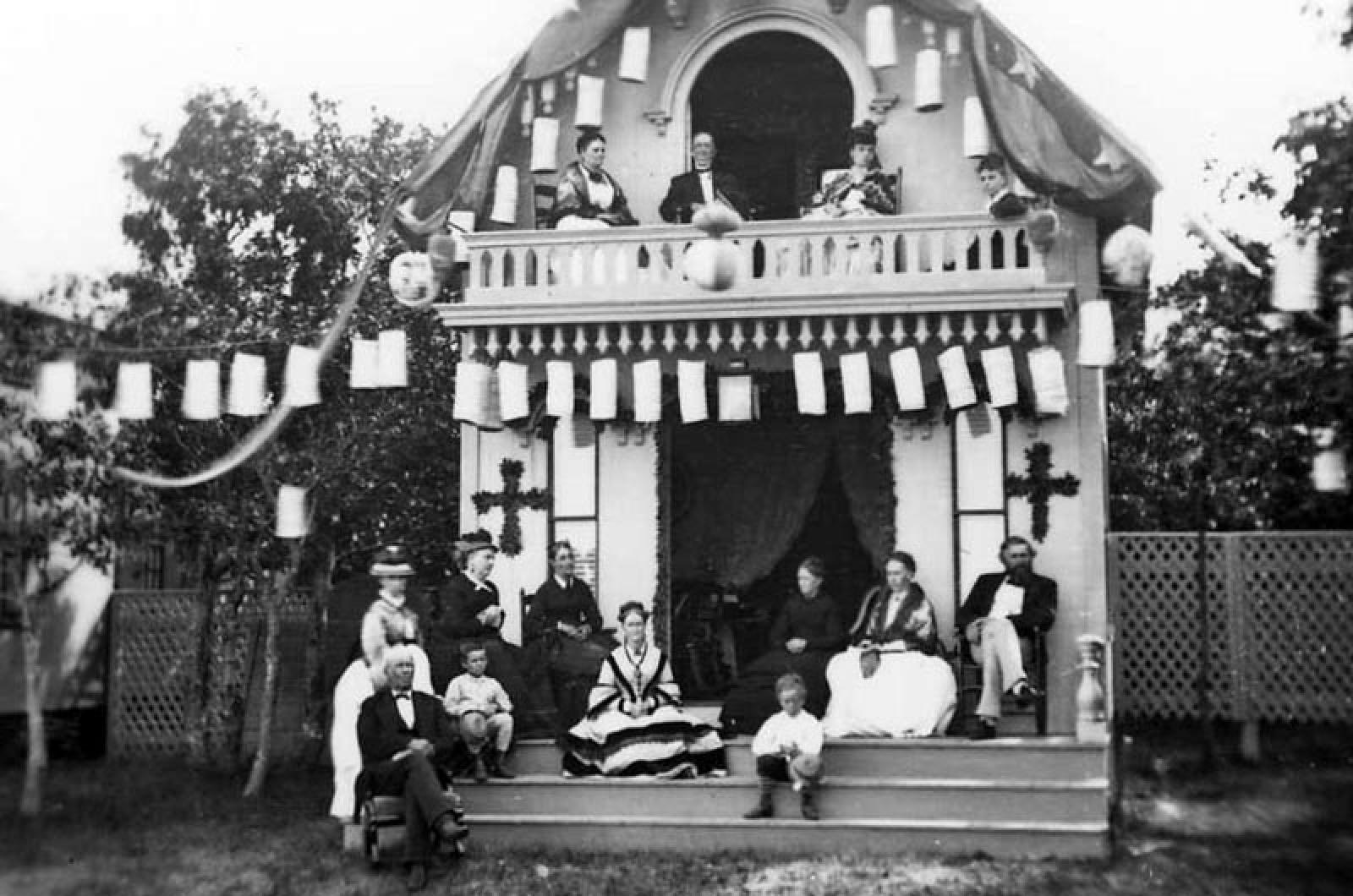From the July 16, 1940 edition of the Vineyard Gazette:
Anactive-looking old lady with a sense of humor is eighty four year old Mrs. Ella J. Perry, a visitor to the Island for seventy-two summers.
When Mrs. Perry first came to the Vineyard, Cottage City, the present Oak Bluffs, was made almost entirely of tents with a few cottages scattered here and there belonging to the “plutocrats.” There was one large tent where the camp meeting residents ate and cooked and another where they slept on piles of straw. The entire camp ground was surrounded by a tall fence which reached from Clinton avenue all the way around. The association even had its own meat and grocery stores inside the fence.
“The gates used to close at 10 o’clock,” Mrs. Perry remembered. “We had to scamper like every thing to get home on time until we found a few loose boards and then we could come in and out as we pleased.”
As a child, she said, she used to look down on the unfortunate people living outside the fence. “We called them Democrats, I believe, the worst insult we could think of.”
There were no dances or entertainment of any kind except croquet, as the camp ground was looked on as almost sacred ground but the members had a lot of “good wholesome fun.” During one camp meeting a man from a tent called Shebang, “who was full of fun, came with an imitation spider on a wire. When everything got serious he flung the spider into the midst of the meeting. You should have heard them yell.”
While Mrs. Perry was still a child, President Grant came to visit Cottage City. He arrived at night and the campers crowded around him, especially the children, demanding a speech. Mrs. Perry remembers the occasion very clearly. She even remembers the entire speech he made when he waled out on the little balcony of the house in which he was staying. This was it:
“Ladies and gentlemen, you must be tired, having been up all day and I am tired also. Goodnight.”
In the early days of the camp meeting, she did not know very much about the rest of the Island, Mrs. Perry says. She occasionally went to Vineyard Haven by street car, to picnics on Lake Tashmoo or to clam feasts in Edgartown on the little train which “chugged along the water’s edge and was always pretty crowded.” Sometimes she would go to Gay Head, which was then an all day excursion. The excursionists would first have to take a steamer up and then be rowed ashore where they would be met by wagons drawn by oxen to take them up to the lighthouse.
“West Tisbury and everything in between was just undiscovered land, as far as I was concerned,” said Mrs. Perry.
Mr. Perry and her family lived in a tent until her younger sister was born and then they moved into a house.
“Of course there was no plumbing and we had to get our own water from a pump over by the place where the Beatrice House is now. We really kept that handle flying. I remember when we had our first water closet put in we thought we were some pun-kins.”
She did not swim or sail frequently because she has never “taken to the water much” but they did have “such lovely bathing suits. They clamped around the ankles and got so heavy with water that you’d pretty near fall over backward when you came out from swimming.”
Speaking of the bathing suits they used to wear, Mrs. Perry remembered that her niece, who is now a grandmother, wore a white alpaca bathing suit once when she was fourteen and was asked by the shocked authorities not to go in the water.
There was always a great danger of fire and every house had to keep a bucket of water on the porch beside a lighted lantern. Here Mrs. Perry went briskly into the house and returned with the ancient rusty lantern which she still has. It has been interesting, she says, to watch the houses growing up in place of the tents which were once there. When they put the asphalt in the roads in Cottage City, people hardly knew how to walk on them because they were so used to the deep sand which had been there.
Perry missed coming to the Vineyard only a few years when her children were very young. “As soon as they could walk I brought them here and they were just as crazy about it as I had been.”
The Old Schoolhouse, North Road, Chilmark. This summer home of MacAlister Coleman is about a hundred years old and used to be the old Cape Higgon schoolhouse, which was used as a town hall and a prayer meeting house as well.
The building remained a schoolhouse for eighty or ninety years, until several schools on the Island were consolidated. When Mr. Coleman bought it, it had been deserted for twenty odd years. The marks of the desks are still in the floors and one of the blackboards is still on the wall, as Mr. Coleman finds it is quite convenient for writing notes to the family. Just this summer Mr. Coleman is completing an extension as an office for his wife, Dr. Ruth Fox.
Compiled by Hilary Wall
library@mvgazette.com







Comments
Comment policy »